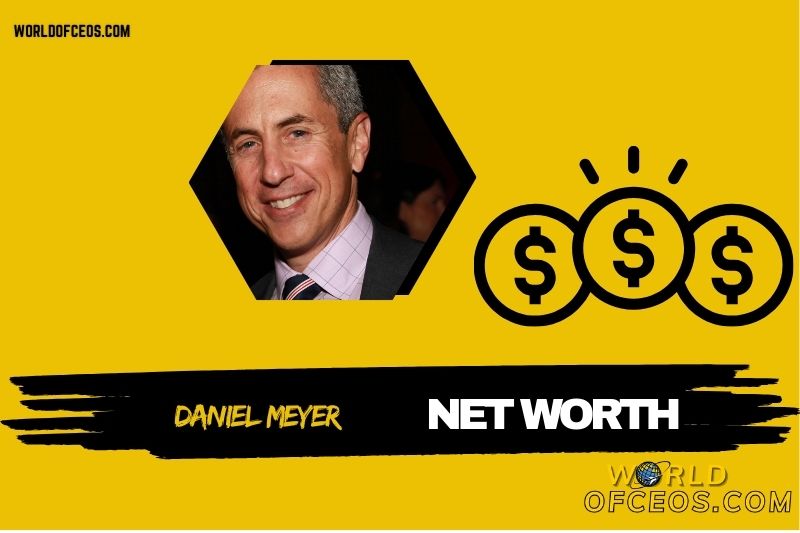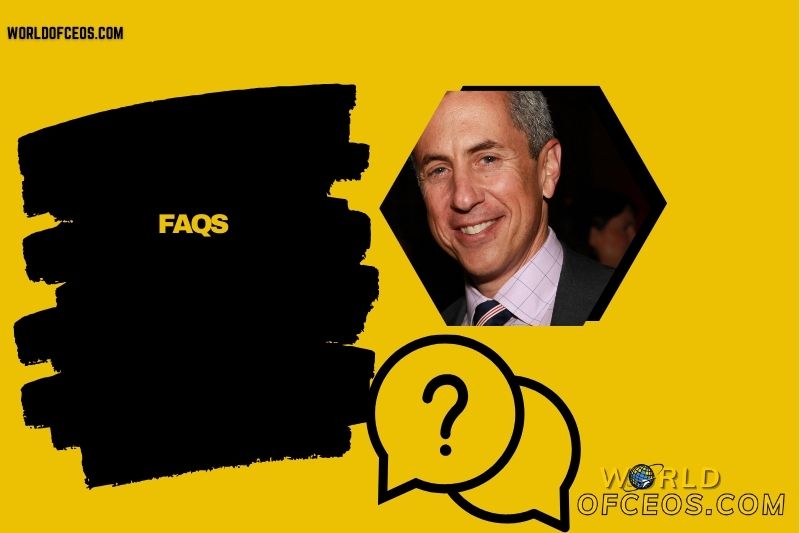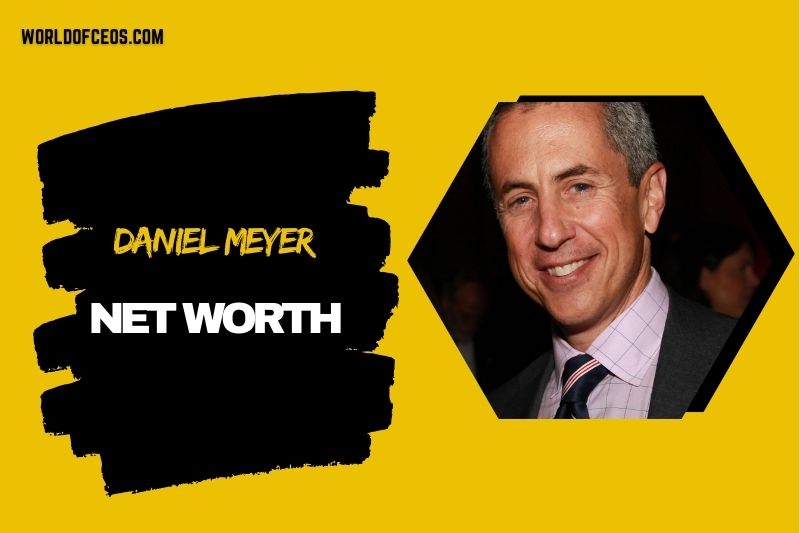When it comes to understanding Daniel Meyer net worth, it’s crucial to explore the key elements that have contributed to his financial success. As the founder and executive chairman of Union Square Hospitality Group (USHG), Meyer has been instrumental in the growth of iconic brands like Shake Shack.
At WorldofCeos, we delve into how Meyer built his wealth through strategic ventures, smart investments, and his unique approach to the hospitality industry. This analysis covers his journey with USHG, the success story of Shake Shack, and the various business decisions that have shaped his career and finances.
Quick Facts
| FACT | DETAIL |
|---|---|
| Real Name | Daniel Meyer |
| Popular Name | Danny Meyer |
| Gender | Male |
| Birth Date | March 14, 1958 |
| Age | 66 (as of 2024) |
| Parents | Roxanne (née Harris), Morton L. Meyer |
| Siblings | N/A |
| Birthplace | St. Louis, Missouri, USA |
| Nationality | American |
| Ethnicity | Jewish |
| Education | Trinity College |
| Marital Status | Married |
| Spouse | Audrey Rayelyn Heffernan |
| Children | N/A |
| Dating | N/A |
| Net Worth | $400 million |
| Source of Wealth | Founder & Executive Chairman of USHG, restaurateur |
| Height | N/A |
What is the Net Worth of Daniel Meyer in 2024?

As of 2024, Daniel Meyer net worth is estimated to be around $400 million. His wealth primarily stems from his success as a restaurateur and entrepreneur, especially through his leadership of the Union Square Hospitality Group and the popular restaurant chain Shake Shack. Comparatively, other industry figures in similar roles have amassed considerable fortunes as well. Here is a list of related people and companies:
- Shake Shack Inc.
- Eleven Madison Park
- Gramercy Tavern
- Blue Smoke
- MoMA (The Museum of Modern Art)
- James Beard Foundation
- Citi Field
- Nationals Park
- The Modern
- Hospitality industry leaders like the most successful CEOs in the world.
These individuals and entities have all made significant impacts in the restaurant and hospitality sectors, contributing to their substantial net worths.
Finance Overview

How He Built His Wealth Through the Union Square Hospitality Group
Daniel Meyer’s journey to financial success began with the foundation of Union Square Hospitality Group (USHG). This group quickly became a powerhouse in the restaurant industry, known for its high-quality dining experiences and customer-focused hospitality.
His unique business model, focusing on creating a strong culture of hospitality, set USHG apart from competitors. Through this approach, Meyer established several renowned restaurants, including the Union Square Cafe, Gramercy Tavern, and The Modern. Each establishment added to his wealth by generating significant revenue streams and reinforcing his status as a leader in the hospitality sector.
His Role in the Success of Shake Shack and Its Financial Growth
Shake Shack started as a humble hot dog stand in Madison Square Park, but under Daniel Meyer’s vision, it transformed into a billion-dollar company. The brand’s growth from a single stand to a publicly traded company exemplifies Meyer’s knack for scaling businesses. His decision to take Shake Shack public proved to be a financial game-changer, elevating both the company’s valuation and his personal net worth. His role in steering the company through its initial public offering (IPO) and subsequent expansion was pivotal. The success of Shake Shack has become a cornerstone of his financial portfolio.
The Influence of His Restaurant Ventures on His Financial Status
Beyond Shake Shack, Meyer’s portfolio includes several other acclaimed dining establishments. Restaurants such as Gramercy Tavern, The Modern, and Blue Smoke have each contributed to his financial status. The awards these restaurants have received, like Michelin Stars and James Beard Awards, not only boost the restaurants’ prestige but also their profitability. Even when some ventures like Tabla closed, Meyer managed these challenges with strategic pivots, ensuring his wealth remained unaffected in the long run.
His Strategic Decision to Eliminate Tipping and Its Impact on Income
In a bold move that shocked the restaurant industry, Meyer decided to eliminate tipping across his restaurants and introduced “Hospitality Included” pricing. This strategy aimed to provide a more equitable pay structure for all employees. However, this shift also led to increased menu prices and some initial backlash. Despite this, the long-term benefits have included better staff retention and a more consistent customer experience, ultimately sustaining his restaurants’ profitability.
His Investments Beyond Restaurants and Their Financial Returns
Meyer’s financial acumen extends beyond his restaurants. His investments in concessions at major sports facilities, such as Citi Field and Nationals Park, have yielded substantial returns. These ventures diversified his portfolio, reducing dependency on a single income stream. Meyer’s business foresight ensures his financial stability even amid industry downturns or unforeseen crises.
Books Authored by Him and Their Contribution to His Wealth
Meyer has also authored several successful books, including Setting the Table and The Union Square Cafe Cookbook. These books have not only sold well but also helped build his personal brand as a hospitality expert. The royalties from these books, along with their influence on the industry, have contributed to his wealth. They serve as both a source of direct income and an indirect marketing tool for his ventures.
Awards and Recognition That Elevated His Career and Wealth
Throughout his career, Meyer has been the recipient of numerous awards that have elevated his standing in the hospitality industry. The 28 James Beard Foundation Awards, among others, have solidified his reputation and added significant value to his personal brand and businesses. Recognition from prestigious organizations has played a crucial role in sustaining customer interest and business growth.
How He Navigated Challenges Like the COVID-19 Pandemic and Protected His Wealth
The COVID-19 pandemic presented unprecedented challenges, but Meyer’s strategic thinking allowed him to navigate the crisis effectively. By closing his restaurants early and securing Paycheck Protection Program loans, he mitigated financial losses. His transparency and adaptability during these tough times preserved both his businesses and his reputation, securing his wealth for the future.
Future Financial Plans and Ventures That Could Increase His Wealth
Looking ahead, Meyer continues to explore new ventures and expansion opportunities. His future plans involve both expanding existing brands and exploring new markets. With his track record, any new venture he pursues is likely to increase his wealth, further solidifying his legacy in the hospitality industry.
FAQs About Daniel Meyer

What is his role in the Union Square Hospitality Group?
He is the founder and executive chairman of Union Square Hospitality Group, overseeing several successful restaurant ventures.
How did he come up with the idea for Shake Shack?
Shake Shack began as a small hot dog stand in Madison Square Park, but his vision and business strategy helped it grow into a major fast-food chain.
What is his educational background?
He studied political science at Trinity College in Hartford, Connecticut, which later influenced his approach to business and hospitality.
What awards has he received in his career?
He and his company have won 28 James Beard Foundation Awards, among other recognitions like the Bon Appetit Best Restaurateur in America Award.
How did his “No Tipping” policy affect his businesses?
The “No Tipping” policy introduced a new pricing model that initially faced backlash but ultimately aimed for equitable employee compensation and consistent customer experience.
What are some of his most famous restaurants?
Some of his most famous restaurants include Union Square Cafe, Gramercy Tavern, The Modern, and Blue Smoke, which have contributed significantly to his wealth.
How has he influenced the restaurant industry?
He has revolutionized the industry with innovative approaches like “Hospitality Included,” which has challenged conventional business models.
What are his future plans in the hospitality sector?
He plans to continue expanding his current ventures and explore new business opportunities that align with his hospitality philosophy.
How did he respond to the COVID-19 pandemic?
He temporarily closed his restaurants and applied for government aid, balancing the need for financial support with ethical considerations.
What is his most popular book?
His book, Setting the Table, is highly acclaimed and has become a New York Times bestseller, contributing to his reputation as an expert in hospitality.
Conclusion
If you’re intrigued by the business minds shaping the world today, I encourage you to explore more on worldofceos.com. Leave your comments, share with friends, or read other insightful articles here.

